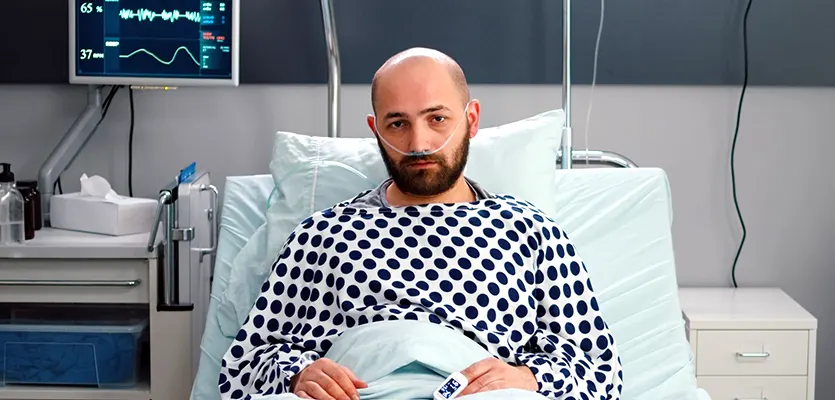A lung transplant is an extensive and critical procedure that involves a lot of care and precision. From the eligibility to the final transplant, there are several factors at play. However, getting a lung transplant isn’t the finish line for a patient. In fact, that’s where a new journey begins.
The next step in the process is lung transplant recovery. Most patients who undergo this surgery never fail to appreciate their second chance at life. But how do you care for the new addition to the body? What are some crucial factors worth keeping in mind during the recovery process?
This blog will explore everything related to recovery after the lung transplant surgery and how to acclimatize yourself to such a drastic change in life.
Read in Hindi:- फेफड़े के प्रत्यारोपण से ठीक होने में कितना समय लगता है?
Right after the Surgery
Following the completion of the lung transplant surgery, the patient is generally wheeled into an intensive care unit or ICU for the upcoming few days to a week.
The patient is typically connected to a ventilator to support their breathing until their transplanted lungs are strong enough to function independently. Additionally, the patient has to be under strict round-the-clock monitoring to ensure their body isn’t rejecting the newly transplanted organ.
Some general monitoring techniques include X-rays or lung biopsies, where tissue samples from the transplanted lung are examined to check for signs of rejection.
If the body rejects the organ, immediate medical interventions are taken to reverse the process. Also, the patient is then kept under critical observation for 1-2 weeks.
How long is the recovery process?
If the initial recovery takes off well and the body doesn’t reject the newly transplanted lung, the next step in the process is to return home after the initial care at the hospital.
You might have to stay for 2-3 weeks until all the risk factors are minimized or eliminated. Regular follow-up check-ins are crucial in the first 2-4 weeks after the surgery.
From the second month, the follow-ups become once every week. However, as a recipient of a new lung, you’ll need to get relevant blood tests every 6 weeks and come in for a check-up every 3-4 months for the remainder of your life.
In general, the overall lung transplant recovery time is between 3-6 months. You need to take it easy, at least for the first 6 weeks, which includes no heavy lifting, bending, jumping, etc.
If you are worried about your work, it might take up to 3 months before you are deemed fit enough to resume work. So, its ideal for planning accordingly before the surgery.
What are some Long-term adjustments after Lung Transplant?
A huge part of lung transplant surgery is the life-long adjustments you have to make to keep yourself in the best health. This includes new medications, rehabilitation therapy, or even switching to a healthier lifestyle to prevent any damage to the organ.
Some of the most crucial adjustments include:
Immunosuppressants
Immunosuppressant therapy after lung transplant is of two types – induction therapy and maintenance therapy.
- If the names aren’t a giveaway, induction therapy is administered before and right after the surgery and includes a high dosage of immunosuppressants to ensure the patient’s body doesn’t reject the organ. It is often coupled with doses of antibiotics and antivirals.
- Maintenance therapy is the type of immunosuppressant therapy a recipient patient takes for the remainder of their life.
Taking immunosuppressants has various downsides or side effects, including higher chances of bacterial, viral and fungal infections, mood disorders, insomnia, diarrhea, dizziness, headaches, acne, etc. Ideally, you discuss any off-beat complication you are experiencing better to manage the dosage and composition of the medication.
Switching to a Healthy Lifestyle
To keep the newly transplanted lung healthy, abiding by a healthier lifestyle is crucial.
There are several factors at play, from the kind of diet you follow to the level of activity you indulge in. Consuming tobacco, smoking, drinking, etc., are completely out of the question.
Indulging in a proper exercise routine after the transplant is crucial to steady and stabilize the body and improve the pulmonary function of the transplanted lung. It is an essential part of the lung transplant recovery process.
Emotional and Social Support
Undergoing a lung transplant isn’t just taxing on your physical health. But, the stress and anxiety before and after the procedure can affect one’s emotional well-being.
Hence, getting optimal emotional support is crucial. It could be from support groups or even from the friends and family that surround you.
If you feel uncomfortable or overwhelmed at any point, discussing the same with the doctor is ideal too.
Final Words
Lung Transplant has the potential to improve one’s quality of life substantially. But, the recovery time after a lung transplant is testing and tedious. Things aren’t as simple as they seem. As a transplant recipient, your body goes through a lot of physical and emotional changes.
Dr. Arvind Kumar is a leading chest surgeon in India with 40+ years of experience and special accolades in performing lung transplant procedures. If you are suffering from deteriorated pulmonary function, a second chance at life is right before you.
For more details, please leave us your query via drarvindkumar.com.

.webp)



